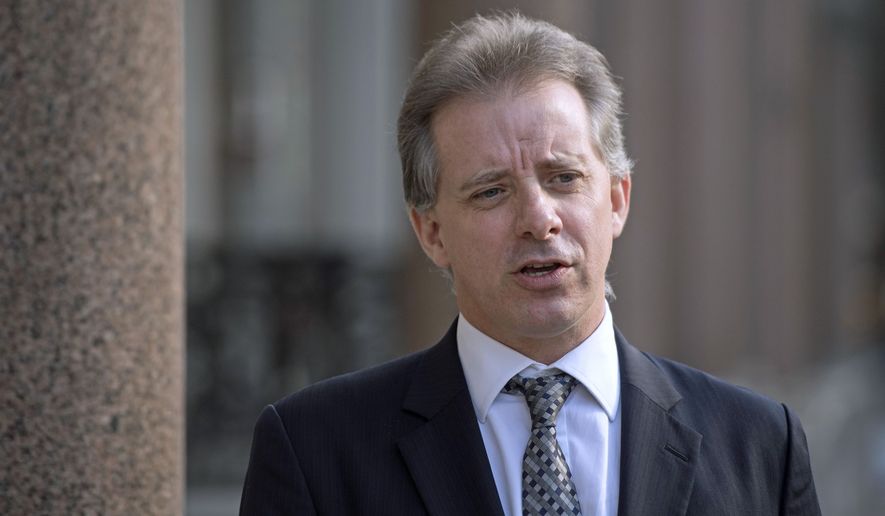The Trump-Russia dossier may be sleazy and inaccurate, but there is no U.S. election law that expressly prohibits such work by a foreign national, the federal government says.
Since the disclosure that Democrats paid former British spy Christopher Steele via middlemen for the anti-Trump memo, some pundits and Republicans have questioned its legality. The dossier’s core charges of collusion remain unproven, officials have said.
Governing such payments is the Federal Election Campaign Act, which is enforced by the Federal Election Commission and law enforcement agencies.
The Washington Times asked the commission for an assessment: Does the act bar campaign payments to foreign nationals such as Mr. Steele?
“The act and commission regulations do not speak to a prohibition on campaign expenditures for services performed by a foreign national,” a spokesman said.
In other words, no FEC regulation or campaign act section makes illegal the pay scheme used by the Hillary Clinton presidential campaign and the Democratic National Committee to Mr. Steele.
The FEC spokesman noted that the act outlaws four types of donations from foreign nationals to U.S. campaigns and related political action committees, as opposed to payments from those entities to foreigners. Foreigners may not donate money for federal or state elections, advertising or a presidential inaugural committee.
Besides making contributions, foreign nationals also are prohibited from “decisions involving election-related activities,” according to guidance posted by FEC. The banned functions include making management decisions and directing campaign funds.
The prohibition does not seem to apply to Mr. Steele and his Orbis Business Intelligence firm, which were not part of the Clinton campaign or the DNC.
The money trail to Mr. Steele went through lawyer Marc E. Elias, who represents the DNC and the Clinton campaign and is steeped in U.S. election law.
Mrs. Clinton first talked in detail about the dossier on Comedy Central’s “The Daily Show” on Nov. 1. She characterized the dossier, with its depiction of private citizen Donald Trump ensconced with urinating prostitutes in the Moscow Ritz-Carlton in 2013, as standard “opposition research.”
And she said it was a perfectly legal campaign expenditure.
“It’s part of what happens in a campaign where you get information that may or may not be useful and you try make sure anything you put out into the public arena is accurate,” Mrs. Clinton said. “So this thing didn’t come out until after the election, and it’s still being evaluated.”
However, Mr. Steele briefed top political reporters during the campaign. Some wrote about the charges in stories picked up by the Clinton campaign, which issued press statements blasting Mr. Trump as colluding with Moscow.
The legality would not stop Republicans’ rage over the dossier itself. Its charges against the Trump campaign remain unconfirmed, yet the FBI appears to have relied on it, in part or in whole, to begin an investigation of the Trump campaign in July 2016.
This means the Obama administration used unproven Democratic Party opposition research to start a criminal investigation into its Republican opponent, Mr. Trump.
Republicans also have questioned the legality of not publicly disclosing the payments to opposition research firm Fusion GPS, which hired Mr. Steele. Clinton campaign finance disclosure forms show payments in the millions of dollars to Mr. Elias’ law firm, Perkins Coie. Fusion says the dossier cost $168,000.
At a House Judiciary Committee hearing last month, Rep. Steve Chabot, Ohio Republican, questioned the entire dossier payment scheme.
“I’m not and never was a prosecutor, but I did some criminal defense work back in the day when I practiced law for almost 20 years,” Mr. Chabot said. “It seems to me that a presidential campaign using a law firm as a conduit to pay for activities with which the campaign itself doesn’t want to be directly associated is more than just dirty politics. It’s also quite possibly illegal.
“To me, it seems that this is at least a violation of campaign finance laws for failure to accurately disclose the actual recipients of campaign disbursements,” he said. “However, this type of arrangement is not illegal, if it’s not illegal under current law, I fear that we’re risking opening Pandora’s box with all sorts of underhanded activities by campaigns being laundered through law firms and shielded under attorney-client privilege.”
The witness that day was Attorney General Jeff Sessions. He refused to discuss the dossier, saying it is part of special counsel Robert Mueller’s investigation into suspected Trump-Russia election collusion.
• Rowan Scarborough can be reached at rscarborough@washingtontimes.com.




Please read our comment policy before commenting.